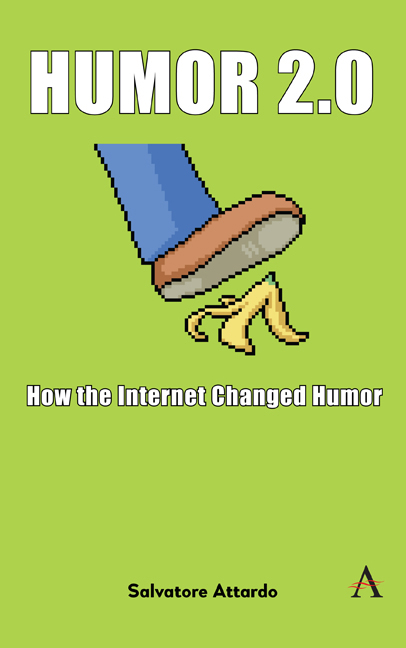Summary
When reading a title like “humor theory” most readers’ eyes glaze over. In fact, a common joke is that analyzing humor is like dissecting a frog: it kills it. Indeed comedians have long known that if you have to explain a joke, it failed. However, we are not here just for fun; we want to get an understanding of what the evolution of humor in the age of the internet means. This goal requires some understanding of how humor works, in general, so that we can then compare how digital or internet humor works. This requires a little knowledge about humor theory. First, we need to distinguish between humor, which is a cognitive (mental) process which causes an emotion (mirth or exhilaration) which may manifest itself in various ways, including laughter, smiling and other bodily or verbal reactions (e.g., the hearer may slap their thighs or may say “that's funny”). Often the reactions are a mix of all the above. Sometimes the hearer may not react positively, either because they fail to identify the humor or because, while they are aware that the speaker intended what they said as funny, they think the intention is inappropriate. The reactions then may be frowning, staring at the speaker, saying “that's not funny,” etc. If both the speaker and the hearer agree that what was said (the text) is funny, then the humor succeeded and the hearer (and the speaker) experience mirth. If they do not agree, the humor failed and one or both of the people in the exchange will not experience mirth and will instead be annoyed, offended or hurt.
Surprisingly, people have pondered the question of why humor is, or may be, funny for millennia. Perhaps we should say “unsurprisingly” if we realize that humans have probably been laughing since they were human given that humor is universal: there are no reports of human groups lacking humor, in one form or another, as we said before. Be that as it may, some of the earliest documented reflections on humor go back to Plato and Aristotle (so as far back as the fourth century BC). Plato claims that humor is a “mixed” feeling because it mixes pain (“envy”) and pleasure. For Plato laughter comes from ridicule and as such it is a negative emotion, which is mixed with the pleasure of amusement.
- Type
- Chapter
- Information
- Humor 2.0How the Internet Changed Humor, pp. 39 - 48Publisher: Anthem PressPrint publication year: 2023

